Ashwagandha and PTSD: Reducing Stress and Anxiety Naturally
Introduction
Post-Traumatic Stress Disorder (PTSD) is more than a collection of memories or flashbacks—it’s a full-body response that keeps the nervous system stuck in survival mode. For many living with trauma, the body continues to release stress hormones long after the danger has passed, leading to anxiety, fatigue, sleep issues, and emotional exhaustion.
One of the most promising natural remedies for rebalancing the body after trauma is Ashwagandha (Withania somnifera), an adaptogenic herb used in Ayurvedic medicine for thousands of years. Known for its ability to lower cortisol, reduce anxiety, and improve resilience, Ashwagandha has gained growing attention in the field of stress recovery—and may offer powerful benefits for those healing from PTSD.
This article explores how Ashwagandha works on the brain and body, why it’s particularly helpful for trauma survivors, and how it can be integrated safely with therapy and other recovery practices.
Looking for supplements for This? Click here.
🌪️ Understanding PTSD: A Stress System That Won’t Turn Off

To appreciate how Ashwagandha helps, it’s important to understand what’s happening inside the body when someone has PTSD.
When trauma occurs, the brain’s amygdala (fear center) activates the fight-or-flight response, flooding the body with cortisol and adrenaline. These hormones prepare you to escape danger—but after trauma, the body may continue acting as if the threat is still present.
In healthy systems, the HPA axis (hypothalamic-pituitary-adrenal axis) balances stress hormones by turning off the alarm once safety returns. In PTSD, this system becomes dysregulated, leaving cortisol levels either chronically high or abnormally low.
The result is a nervous system that’s stuck in hyperarousal—on edge, anxious, and exhausted all at once.
Common symptoms linked to cortisol dysregulation include:
Persistent anxiety or hypervigilance
Insomnia and nightmares
Emotional numbness or irritability
Muscle tension and fatigue
Digestive issues and weakened immunity
This is where Ashwagandha comes in—by helping the body regulate cortisol and rebalance the HPA axis naturally.
🌿 What Is Ashwagandha?
Ashwagandha, also known as Indian Ginseng or Winter Cherry, is a root-based adaptogenic herb long used in Ayurveda to promote vitality and calm. The Sanskrit name translates to “the smell of a horse,” symbolizing the herb’s ability to impart strength, stamina, and grounding.
Modern research confirms many of Ashwagandha’s traditional uses: it reduces stress hormones, improves mood and sleep, enhances resilience, and supports hormonal balance.
Its active compounds, called withanolides, help regulate neurotransmitters like GABA, serotonin, and dopamine—all of which are often disrupted in trauma survivors.
🧬 How Ashwagandha Works in the Body
Ashwagandha doesn’t just mask stress—it helps recalibrate the entire stress response system.
Regulates Cortisol Levels
Clinical studies show Ashwagandha can reduce cortisol by up to 30%, helping calm the body’s overactive stress response. Lower cortisol means fewer anxiety symptoms, better sleep, and improved emotional regulation.
Supports the HPA Axis
By balancing communication between the hypothalamus, pituitary, and adrenal glands, Ashwagandha restores rhythmic cortisol cycles—helping you feel alert in the morning and relaxed at night.
Enhances GABA and Serotonin Activity
Ashwagandha increases GABAergic signaling, which quiets neural excitability and reduces anxiety. It also supports serotonin balance, improving mood and emotional resilience.
Reduces Inflammation and Oxidative Stress
Chronic trauma can lead to inflammation in the brain, contributing to fatigue, depression, and brain fog. Ashwagandha’s antioxidants protect neurons and support neuroplasticity, the brain’s ability to heal and adapt.
Improves Sleep and Restorative Recovery
By reducing nighttime cortisol and anxiety, Ashwagandha promotes deeper, more restorative sleep—essential for trauma recovery and emotional regulation.
Together, these effects help reset the biological systems most affected by trauma.
⚖️ Ashwagandha and the Cortisol Connection
Cortisol is the key hormone that connects stress and PTSD. When the body perceives danger, cortisol spikes to mobilize energy and sharpen focus. However, chronic overexposure to cortisol damages brain regions like the hippocampus (memory) and prefrontal cortex (reasoning).
This leads to:
Heightened fear and anxiety
Impaired memory and decision-making
Fatigue and burnout
Ashwagandha acts as a cortisol modulator—it doesn’t suppress the hormone completely but brings it back to a healthy range. This adaptability makes it unique compared to pharmaceuticals that blunt the stress response entirely.
In one study published in Indian Journal of Psychological Medicine (2012), adults under chronic stress who took 300 mg of Ashwagandha twice daily experienced:
27.9% lower cortisol levels
69% reduction in stress and anxiety scores
11% improvement in sleep quality
These results are particularly promising for trauma survivors, whose systems are often dominated by cortisol imbalance.
🌸 GABA, Serotonin, and Ashwagandha’s Calming Effect
Beyond cortisol, Ashwagandha also interacts with neurotransmitters responsible for calm and stability.
GABA (gamma-aminobutyric acid) is the brain’s main inhibitory neurotransmitter—it helps quiet overactivity. In PTSD, GABA function is reduced, leading to hyperarousal and insomnia.
Ashwagandha enhances GABA receptor activity, producing a gentle calming effect without sedation. It works similarly to anti-anxiety medications (like benzodiazepines) but naturally and without risk of dependency.
At the same time, Ashwagandha supports serotonin and dopamine balance, helping lift mood, motivation, and emotional stability—areas that trauma often disrupts.
This makes Ashwagandha a neurochemical balancer, not just a stress reliever.
💤 Ashwagandha and Sleep in PTSD Recovery
Insomnia is one of the most persistent symptoms of PTSD. The mind can’t stop scanning for danger, and cortisol remains high at night.
Ashwagandha promotes better sleep through multiple mechanisms:
Lowers nighttime cortisol
Reduces anxiety before bed
Enhances melatonin synthesis naturally
Improves deep sleep (non-REM cycles)
A 2020 study in Cureus Journal of Medical Science found that 300 mg of Ashwagandha extract twice daily for 10 weeks significantly improved sleep onset, quality, and morning alertness—without dependency or grogginess.
For trauma survivors, consistent, restorative sleep is one of the most powerful healing mechanisms available.
Looking for supplements for This? Click here.
🧘 Ashwagandha’s Role in Emotional Resilience
Trauma recovery requires both physical and emotional resilience. When stress hormones are high and neurotransmitters depleted, small triggers can cause big reactions.
Ashwagandha helps by:
Enhancing adaptability: Adaptogens train the body to handle stress without overreacting.
Improving focus and memory: Lower cortisol improves cognitive function and concentration.
Stabilizing mood: Balanced GABA and serotonin reduce emotional swings.
Protecting brain cells: Antioxidants support brain plasticity and healing.
Over time, this translates into greater nervous system flexibility—the ability to respond to challenges without losing inner equilibrium.
🌿 Combining Ashwagandha with Other Natural Supports
Ashwagandha works best as part of a holistic recovery plan that supports the mind, body, and nervous system.
Magnesium
Magnesium glycinate or threonate enhances GABA and muscle relaxation, complementing Ashwagandha’s calming effects.
Omega-3 Fatty Acids
These support neural repair and reduce inflammation associated with PTSD and chronic stress.
B Vitamins
B5, B6, and B12 are essential for adrenal function, neurotransmitter production, and energy metabolism.
L-Theanine
A gentle amino acid from green tea that increases alpha brain waves, promoting relaxed focus.
Probiotics
Support the gut-brain axis and serotonin synthesis, improving emotional stability and stress resilience.
By combining these nutrients with Ashwagandha, you support both the psychological and biochemical sides of healing.
Looking for supplements for This? Click here.
🌅 The Best Time and Form to Take Ashwagandha
Ashwagandha is most effective when taken consistently.
Recommended dosage:
300–600 mg per day of a standardized extract (with 5% withanolides)
Often split into morning and evening doses
Forms available:
Capsules or tablets (most convenient)
Powder (traditionally mixed with warm milk or smoothies)
Liquid extract (for fast absorption)
Timing tips:
Take in the morning to reduce daytime anxiety and fatigue.
Take before bed for better sleep and recovery.
Always start low and increase gradually, as individual responses vary.
⚠️ Safety and Precautions
Ashwagandha is generally safe for long-term use, but certain people should proceed with caution.
Avoid or consult your doctor if you:
Are pregnant or breastfeeding
Have hyperthyroidism (Ashwagandha can raise thyroid hormones)
Take sedatives, thyroid medications, or immunosuppressants
Have autoimmune conditions—monitor closely, as Ashwagandha may stimulate immune activity
Mild side effects (rare): upset stomach, loose stools, or mild drowsiness if taken in high doses.
Always choose a high-quality, third-party-tested supplement to ensure purity and potency.
🧠 What Research Says About Ashwagandha and Trauma

While few studies focus specifically on PTSD, a wealth of research demonstrates Ashwagandha’s impact on stress, anxiety, and cortisol—all central mechanisms of trauma.
Key findings:
Journal of Clinical Psychiatry (2019): Ashwagandha reduced anxiety scores as effectively as certain anti-anxiety medications, without sedation.
Phytomedicine (2021): Participants taking 600 mg daily reported significant improvements in resilience, fatigue, and concentration.
Indian Journal of Psychological Medicine (2012): Ashwagandha reduced cortisol and improved overall well-being by nearly 70% over 60 days.
These findings align with trauma research showing that lower cortisol and higher GABA activity improve outcomes in PTSD treatment.
Ashwagandha, therefore, supports both the biochemical and emotional dimensions of recovery.
🌸 Pairing Ashwagandha with Therapy and Mindfulness
Ashwagandha is not a replacement for trauma therapy—it’s a supportive ally that enhances your capacity to heal.
When combined with therapeutic practices, its calming and restorative effects make emotional work more sustainable.
Helpful integrations:
Somatic therapy: Ashwagandha reduces hyperarousal, helping you stay grounded during body-based trauma work.
Looking for online therapy ? Click Here.
EMDR or CBT: Improves concentration and emotional regulation between sessions.
Mindfulness and breathwork: Complements vagus nerve activation by quieting the HPA axis.
Want to try Breathwork? Click Here.
Yoga and meditation: Ashwagandha amplifies the benefits of parasympathetic activation, fostering calm awareness.
By nourishing your biology, you create the internal stability needed for deeper psychological processing.
🌿 Sample Daily Ashwagandha Recovery Routine
Morning
300 mg Ashwagandha (with breakfast)
B-Complex and Omega-3 supplement
10 minutes of sunlight and slow breathing
Afternoon
Herbal tea or L-Theanine for calm focus
Nutritious lunch with lean protein and healthy fats
Evening
300 mg Ashwagandha (before dinner or bedtime)
Magnesium Glycinate (200–300 mg)
Gentle yoga, stretching, or journaling before bed
This simple rhythm helps regulate cortisol, improve energy during the day, and promote deep sleep at night.
🌙 The Long-Term Benefits of Ashwagandha for PTSD
Ashwagandha works gradually, but its benefits build over time. After several weeks of consistent use, many people report:
Fewer anxiety spikes or panic episodes
More stable energy and fewer crashes
Better sleep quality and fewer nightmares
Improved focus and emotional resilience
A deeper sense of calm and safety in the body
Because PTSD recovery often involves cycles of stress and rest, adaptogens like Ashwagandha help smooth those cycles, making healing more sustainable.
💫 Healing Through Regulation, Not Suppression
Pharmaceutical treatments for PTSD often aim to suppress symptoms—like anxiety or insomnia—by altering neurotransmitters quickly. While sometimes necessary, they can come with side effects and dependency risks.
Ashwagandha takes a different approach: it works with the body’s stress system rather than against it. It doesn’t sedate you—it retrains your biology to respond appropriately to stress, restoring resilience instead of numbing it.
That’s the essence of adaptogenic medicine—teaching the body how to adapt, recover, and thrive again.
🌻 Final Thoughts: Reclaiming Calm After Trauma
Healing from PTSD is a journey of re-teaching your nervous system that safety exists. Ashwagandha, with its deep-rooted history and modern scientific validation, offers a gentle, sustainable way to support this process.
By calming cortisol, enhancing GABA, and improving sleep and emotional stability, it helps rebuild the internal foundation of peace that trauma once disrupted.
When combined with therapy, nutrition, movement, and compassion, Ashwagandha becomes more than a supplement—it becomes a daily reminder that your body can heal.
Healing doesn’t happen overnight, but each dose, each breath, each moment of calm adds up. Over time, the body relearns what safety feels like—and that’s when true recovery begins. 🌿
Looking for online therapy ? Click Here.
🧾 References
Chandrasekhar K et al. “A prospective, randomized double-blind study of safety and efficacy of high-concentration Ashwagandha root extract in reducing stress and anxiety.” Indian Journal of Psychological Medicine. 2012.
Lopresti AL, Drummond PD. “A systematic review of Ashwagandha’s anxiolytic effects.” Journal of Clinical Psychiatry. 2019.
Panossian A, Wikman G. “Effects of adaptogens on the central nervous system and the molecular mechanisms associated with their stress–protective activity.” Pharmaceuticals. 2010.
Blom EH et al. “Magnesium and stress resilience: implications for anxiety and sleep.” Nutrients. 2018.
Raison CL, Miller AH. “When not enough is too much: The role of inflammation in stress-related disorders.” Am J Psychiatry. 2013.
van der Kolk, Bessel A. The Body Keeps the Score. Viking, 2014.
Taneja M, et al. “Efficacy and safety of Ashwagandha extract in improving sleep quality.” Cureus. 2020.
National Center for PTSD, U.S. Department of Veterans Affairs. “Understanding PTSD and Recovery.” 2022.
Related Posts
-
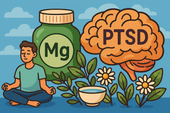
Magnesium and PTSD: Calming the Nervous System
Magnesium is one of the body’s most powerful natural stress relievers. 🌿 Learn how this essential mineral helps calm the nervous system, lower cortisol, ease anxiety, and support better sleep—making it a key ally for anyone recovering from trauma or PTSD.
-
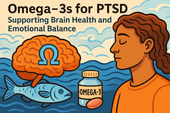
Omega-3s for PTSD: Supporting Brain Health and Emotional Balance
Omega-3s play a vital role in calming the brain and restoring balance after trauma. 🌊 Discover how these essential fatty acids support PTSD recovery by reducing inflammation, balancing neurotransmitters, improving sleep, and promoting emotional resilience—helping your brain heal from the inside out.
-
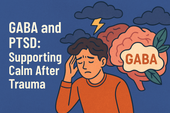
GABA and PTSD: Supporting Calm After Trauma
Therapy helps the brain rewire after trauma, restoring safety and self-trust. 🛋️ Discover how modern therapeutic approaches—like EMDR, CBT, and somatic therapy—help regulate the nervous system, calm intrusive memories, and rebuild emotional resilience for people recovering from PTSD and chronic stress.
-
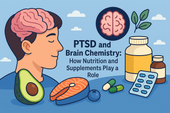
PTSD and Brain Chemistry: How Nutrition and Supplements Play a Role
PTSD isn’t just psychological—it’s deeply biological. 🧠 Learn how trauma reshapes brain chemistry and how nutrition, omega-3s, magnesium, B vitamins, and adaptogens can help rebalance neurotransmitters, reduce inflammation, and support emotional recovery from the inside out.
-
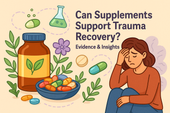
Can Supplements Support Trauma Recovery? Evidence & Insights
Can nutrients like Vitamin D and Zinc really support trauma recovery? 🌞 These two essential micronutrients play powerful roles in immune balance, inflammation control, and hormonal stability—all key systems disrupted by chronic stress and trauma. Learn how replenishing them can help restore strength and emotional resilience.
-
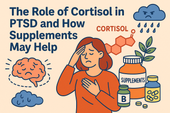
The Role of Cortisol in PTSD and How Supplements May Help
Your adrenal glands play a vital role in how your body responds to stress—but when they’re overworked, fatigue and anxiety can follow. 🌿 Learn how to support adrenal health naturally with nutrients, adaptogens like ashwagandha and rhodiola, and lifestyle habits that restore hormonal balance and steady energy.
-
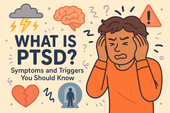
What Is PTSD? Symptoms and Triggers You Should Know
Post-Traumatic Stress Disorder (PTSD) can affect anyone who has experienced deep emotional or physical trauma. 🌪️ Learn how PTSD develops, what symptoms to look for, and the triggers that reignite distress—plus how understanding your body’s response to trauma is the first step toward healing and recovery.
-
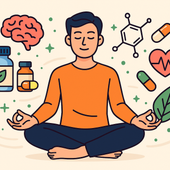
Creating a Daily Supplement Stack for Stress and Cortisol Management: A Science-Based Guide
Building a daily supplement stack for stress and cortisol management can help restore balance, focus, and calm in your life. 🌿 Learn how adaptogens, magnesium, omega-3s, and other key nutrients support your body’s natural stress response from morning to night—so you can feel grounded, energized, and resilient every day.
-
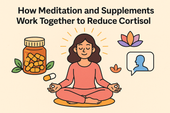
How Meditation and Supplements Work Together to Reduce Cortisol: A Complete Guide to Calming the Mind and Body
Meditation and supplements can work hand in hand to naturally reduce cortisol, your body’s main stress hormone. 🌿 Learn how mindfulness practices, adaptogenic herbs, and nutrient support like magnesium, omega-3s, and B vitamins create a powerful synergy for calm, focus, and emotional balance—backed by science and daily rituals that truly reset your stress response.
-
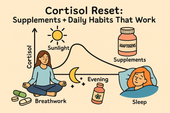
Cortisol Reset: Supplements + Daily Habits That Work
-
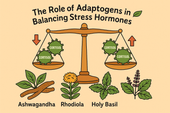
The Role of Adaptogens in Balancing Stress Hormones
Adaptogens work at the root of stress — your nervous system. 🌿 Learn how these powerful herbs help regulate cortisol, calm your nerves, and restore balance between energy and relaxation. ✨
-
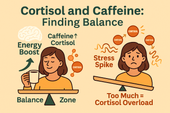
Cortisol and Caffeine: How Much Is Too Much?
Caffeine can boost energy and focus — but too much can overstimulate your stress hormones. ☕ Learn how caffeine affects cortisol, energy levels, and mood, and discover how to find the perfect balance for lasting calm and clarity. 🌿
-
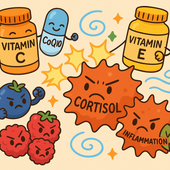
Antioxidants for Stress Management and Cortisol Control
When stress overwhelms your body, antioxidants come to the rescue. 🌿 Learn how vitamin C, CoQ10, and other natural compounds help reduce oxidative stress, regulate cortisol, and restore calm energy from within. ✨
-
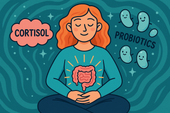
Cortisol and Gut Health: How Probiotics May Help
Chronic stress doesn’t just affect your mind — it changes your gut. 🌿 Learn how cortisol disrupts the microbiome and how probiotics can help restore balance, improve digestion, and calm your stress response naturally. ✨
-

Vitamin D and Cortisol: Supporting Immune Balance
Vitamin D does more than strengthen bones — it helps regulate cortisol and support immune balance. 🌞 Learn how this essential hormone-like nutrient restores calm, improves mood, and strengthens your body’s natural stress defenses. 🌿
-
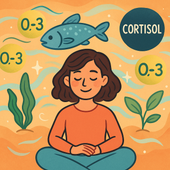
Omega-3s and Cortisol: Fighting Inflammation Naturally
Omega-3s are more than heart-healthy fats — they’re natural cortisol regulators. 🌿 Learn how EPA and DHA help reduce chronic inflammation, calm the nervous system, and support stress recovery from the inside out. ✨
-
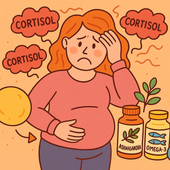
High Cortisol and Belly Fat: Can Supplements Help?
Chronic stress can make belly fat harder to lose — but supplements like ashwagandha, magnesium, and omega-3s may help restore cortisol balance. 🌿 Learn how science-backed nutrients support fat metabolism, calm your stress response, and bring your body back into harmony. ✨
-
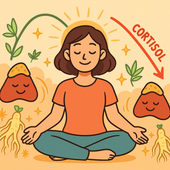
How Ginseng Can Support Energy and Cortisol Balance
Ginseng is one of nature’s most powerful adaptogens, helping your body handle stress without burning out. 🌿 Learn how this ancient root supports balanced cortisol, steady energy, and sharper focus — restoring vitality naturally and sustainably. ✨
-
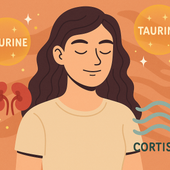
Taurine and Cortisol: Supporting Focus Under Stress
When cortisol surges, focus fades — but taurine helps restore balance. 🌿 Learn how this powerful amino acid calms your nervous system, regulates stress hormones, and sharpens concentration without jitters or fatigue. ✨
-
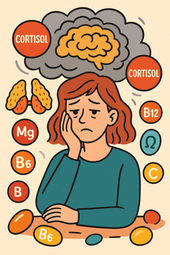
The Link Between Cortisol, Brain Fog, and Nutrient Deficiencies
When brain fog sets in, it’s not just in your head — it’s in your hormones. 🌿 Discover how cortisol imbalance and nutrient deficiencies like low magnesium, B vitamins, and omega-3s can cloud your focus and how restoring balance brings back mental clarity and calm. ✨
-
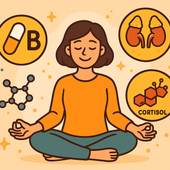
B Vitamins for Stress, Energy, and Cortisol Regulation
B vitamins are the foundation of stress resilience and steady energy. 🌿 Learn how this essential group of nutrients helps regulate cortisol, restore focus, and keep your nervous system calm — giving you balance from the inside out. ✨
-

Cortisol Imbalance and Chronic Fatigue: Can Supplements Help?
When chronic stress keeps cortisol high, fatigue and brain fog follow. 🌿 Learn how to rebalance your stress hormones naturally with calming nutrients, adaptogens, and lifestyle rituals that restore energy, focus, and inner peace. ✨
-

Adaptogen Stacks for Better Sleep and Lower Stress Hormones
Adaptogens can help your body recover from stress and sleep better by regulating key hormones like cortisol and adrenaline. 🌿 Learn how adaptogen stacks work to restore balance, calm the mind, and rebuild resilience — so you can rest deeply and wake renewed. ✨
-

Phosphatidylserine for Nighttime Cortisol Control
When stress hormones stay high at night, deep rest becomes impossible. 🌙 Discover how phosphatidylserine helps calm the brain, reduce nighttime cortisol, and restore healthy sleep rhythms — so you can wake up peaceful, clear, and recharged. ✨
-

Magnesium for Stress Relief and Cortisol Reduction
Magnesium is one of the most powerful natural tools for stress relief. 🌿 This essential mineral calms your nervous system, lowers cortisol, and helps your body recover from chronic tension. Learn how magnesium replenishes balance, improves sleep, and restores inner peace — naturally. ✨
-

Supplements to Improve Sleep by Balancing Cortisol
When cortisol stays high at night, sleep becomes a struggle. 🌙 Discover natural supplements that calm the nervous system, lower stress hormones, and restore your body’s natural rhythm. From magnesium and ashwagandha to L-theanine and phosphatidylserine, learn how to build deeper, more restorative rest. 🌿
-

Cortisol and Sleep: Why Stress Keeps You Awake
When stress keeps your body in fight-or-flight mode, cortisol refuses to calm down — and sleep becomes impossible. 🌙 Learn how elevated cortisol disrupts your circadian rhythm, suppresses melatonin, and turns restless nights into exhaustion. Discover how to restore balance and reclaim deep rest. ✨
-

L-Theanine for Cortisol Balance and Anxiety Relief
L-Theanine — the calming amino acid from green tea — helps quiet the mind and balance cortisol, the body’s key stress hormone. 🌿 Learn how it promotes calm focus, eases anxiety, and supports deep rest without sedation, backed by modern research and centuries of tradition. ✨
-

Rhodiola Rosea and Stress Resilience: A Natural Cortisol Regulator
Rhodiola rosea is one of nature’s most powerful tools for resilience. 🌿 This Arctic root helps balance cortisol, fight fatigue, and sharpen focus — keeping you calm yet energized even under stress. Discover the science behind Rhodiola’s adaptogenic power and how it helps your body thrive under pressure. ✨
-

Ashwagandha for Cortisol Balance: What the Science Says
Ashwagandha helps your body recover from chronic stress by calming the adrenal system and balancing cortisol — your key stress hormone. 🌿 Learn what science says about this powerful adaptogen, how it restores energy and focus, and why it’s one of nature’s most effective tools for modern stress relief. ✨
-

Supplements That Naturally Lower Cortisol Levels
When cortisol levels calm, your energy transforms — no more crashes or jitters, just steady focus and inner peace. 🌿 Learn which natural supplements and habits lower stress hormones, boost calm energy, and help your body thrive with balance instead of burnout. ✨
-

What Is Cortisol Imbalance? Symptoms You Shouldn’t Ignore
Cortisol — your body’s main stress hormone — keeps you alert and energized, but when it’s out of balance, it can drain your health. 🌿 Learn the signs of cortisol imbalance, from fatigue and anxiety to sleep disruption and stubborn weight gain, and discover how to restore calm, energy, and hormonal harmony naturally. ✨
-

The Best Daily Multivitamins for Menopausal Women
Menopause brings new nutritional needs that your old vitamin routine may no longer meet. 🌿 Discover how the right daily multivitamin can boost energy, balance mood, support bone and heart health, and keep your skin glowing. Learn which nutrients truly matter — from vitamin D to magnesium and B12 — to feel strong and vibrant every day. ✨
-

Antioxidants and Menopause: Fighting Inflammation Naturally
During menopause, oxidative stress and inflammation can quietly accelerate aging, fatigue, and skin changes. 🌿 Learn how antioxidants — from vitamins C and E to polyphenols in berries and green tea — help neutralize free radicals, reduce inflammation, and restore balance naturally. Discover the science of radiant, resilient aging. ✨
-

How CoQ10 Supports Heart Health After Menopause
After menopause, heart health becomes more important than ever. ❤️ Discover how CoQ10 — your body’s natural energy molecule — supports cardiovascular strength, restores vitality, and protects against oxidative stress. Learn how this essential nutrient helps keep your heart energized, balanced, and resilient through every stage of life. 🌿
-

Collagen Supplements for Skin and Joint Health Post-Menopause
After menopause, collagen loss affects both skin elasticity and joint comfort — but supplements can help rebuild from within. 🌸 Learn how collagen peptides, vitamin C, and other nutrients work together to restore firmness, reduce stiffness, and keep you glowing and mobile well into your next chapter. ✨
-

Calcium and Vitamin D: Protecting Bone Health in Menopause
Menopause brings hormonal changes that can weaken bones—but with the right nutrients, strength and stability can be rebuilt. 🦴 Learn how calcium and vitamin D work together to protect bone density, prevent fractures, and keep your body resilient. This guide explores nutrition, sunlight, and lifestyle habits that help your bones stay strong and vibrant for years to come. ☀️💪
-

Adaptogens for Energy and Resilience During Menopause
Feeling drained or emotionally scattered during menopause? 🌿 Discover how adaptogenic herbs like Ashwagandha, Rhodiola, and Ginseng can restore energy, balance cortisol, and build emotional resilience. Learn how these natural allies work with your body—not against it—to help you stay strong, focused, and calm through life’s hormonal changes. 🌸
-

Supplements That Help Beat Menopause Fatigue
Menopause fatigue can feel like more than tiredness—it’s a total energy crash. This guide explores how specific supplements, mindful breathwork, and therapy can help restore balance. Learn how nutrients like B vitamins, magnesium, and adaptogens rebuild your stamina, while breathwork and emotional healing calm your nervous system and bring vitality back to your days. 🌿✨
-

Herbal Blends for Menopausal Restlessness: Finding Calm in Transition
Herbal blends bring the wisdom of nature into moments of rest and renewal. Discover how soothing herbs like chamomile, lemon balm, and ashwagandha work together to calm menopausal restlessness, balance hormones, and invite deep relaxation. 🌿💫
-

Magnesium + Glycine for Deep Sleep During Menopause
Nutrients like magnesium, glycine, and B vitamins form the foundation for deep, restorative sleep during menopause. Discover how these natural compounds calm your nervous system, balance hormones, and help you wake up refreshed and recharged. 🌿💤
-

Melatonin and Menopause: Restoring Your Sleep Cycle
Nutrients are the foundation of hormone balance and energy. Learn how vitamins, minerals, and whole foods like greens, salmon, and berries nourish women’s bodies during menopause and beyond — restoring vitality, mood, and strength. 🌿🥗
-

How L-Theanine Helps With Menopausal Anxiety
Science continually deepens our understanding of the human body, from hormones to neurotransmitters. Discover how evidence-based research shapes modern wellness — bridging natural medicine, neuroscience, and hormone balance for healthier living. 🔬🌿
-

Can Ginkgo Biloba Improve Memory in Menopausal Women?
Hormone therapy can be a powerful tool for easing menopause symptoms and restoring balance. Learn how it works, the types available, and how to combine it safely with lifestyle and natural support for optimal well-being. 🌸💊
-

B Vitamins for Mental Clarity During Menopause
Nutrients are the foundation of mental and physical balance during menopause. Discover how vitamins, minerals, and whole foods like leafy greens, fish, nuts, and citrus can fuel energy, clarity, and calm while supporting hormonal health. 🌿✨
-

Mood Swings and Menopause: Natural Nutrient Support
Probiotics do more than support digestion — they help balance mood, hormones, and immunity too. Learn how a healthy gut microbiome can ease menopause symptoms, boost energy, and improve emotional resilience naturally. 🌿🦠
-

Brain Fog in Menopause: Supplements That May Help
Supplements can be powerful allies in restoring balance, energy, and focus—especially during menopause. Learn how nutrients like omega-3s, vitamin D, magnesium, and herbal adaptogens work together to support brain health, reduce stress, and promote lasting vitality. 🌿💊
-

Adaptogen Stacks for Reducing Night Sweats
Hormone detox isn’t about cleansing your body—it’s about restoring flow. Learn how the liver, gut, and endocrine systems work together to eliminate hormone buildup and how herbs like milk thistle, dandelion, and schisandra support balance, clarity, and natural vitality. 🌿💫
-

Cooling Menopause Symptoms with Herbal Support
Ashwagandha is one of nature’s most powerful adaptogens, helping women manage stress, sleep better, and balance hormones naturally. Discover how this ancient root supports calm energy, emotional resilience, and relief from menopause-related anxiety and fatigue. 🌿💫

















































